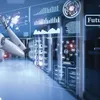This startup by San Francisco-based founders uses AI to find the right hires for corporates
Ashutosh Garg and Varun Kacholia's startup Eightfold.ai uses petabytes of data to match internal employees to new opportunities within their own company, and elsewhere.
The coronavirus outbreak is causing the world economy to go into a deep recession. Millions of people are expected to be laid off from their current jobs and re-enter the job market due to the economic downturn caused by the COVID-19. They need to know where their skills stand and whether they would have to transfer to new jobs. This is where Ashutosh Garg's and Varun Kochalia's .ai steps in to make employees relevant in the post-COVID world.
Founded in 2016, Eightfold uses deep learning and artificial intelligence to break down people’s work into skills and other transferable experiences. It can match internal employees to new opportunities to put their skills to work. It can help recruiters find people with the potential to fill their openings, even if they’re not in a job with a matching job title right now. And it can provide job seekers much more visibility into how they can fit into a company with hundreds of job openings.

Ashutosh Garg, CEO of Eightfold
The founders
Ashutosh Garg graduated from IIT-Delhi in 1997 before he went to the US to finish his PhD in Computer Engineering at the University of Illinois, Urbana-Champaign. He went on to work with IBM Research. He has several thousand research citations and more than fifty patents.
Varun Kacholia graduated from IIT-Bombay in 2004 and finished his Master's from Berkeley. Proficient in search, ranking, and machine-learning, he led the News Feed team at Facebook, and the YouTube Search and Recommendations team at Google.
The founders met at Google and over time, realised that they could apply their AI experience to solving a new challenge – where AI solutions could make a real difference to employment. The founders decided to go after the challenge of finding talent and providing the best career options.
Eightfold wants to help people achieve the best career they can, freed up from the outdated over-reliance on tools and processes like resumes, bad job interviews, and job descriptions.
The problem statement
Eightfold recognised the problems faced by employees:
1) People quit their jobs for new challenges and new roles when there are plenty of challenges in their own companies to apply their skills to new roles;
2) Recruiters get hundreds of resumes, but don’t have a great way of seeing who’s a goodmatch for a job.
3) Job seekers don’t have a good way of searching for a job; they are stuck searching by keywords and titles instead of seeing how they have the potential to apply their skills to new challenges. There is very little ‘hiring for potential’, which hurts both companies and job seekers.
"To make sense of all this, it’s only possible with a huge amount of information (more than a billion profiles of people) and very advanced artificial intelligence that has analysed these profiles. AI has seen the patterns of millions of careers, learning how people move from school to work to new work at such scale that it can accurately determine who is and isn’t a great match for an open job," Ashutosh tells YourStory.
Eightfold.ai has partners, customers, and a full-time office in India supporting their B2B product. They see the market in India and Asia as huge for AI as companies need a better way of matching the right people to right jobs, whether new candidates or internal employees. There is also the need to improve retention rates, succession planning, and internal mobility.
What does the platform do?
"Eightfold’s Talent Intelligence Platform matches individuals to opportunities at scale. The Talent Intelligence Platform has analysed more than one billion career paths, and calculated the individual factors such as experiences, education, and skills that predict movement through career paths. These calculations form a model that is applied to the career path of any individual and any position. For an individual, the model will rank available positions and show the individual why a position is a match for their qualifications. For a position, the model will rank available candidates and show a recruiter or hiring manager why a person is a match for the position requirements," says Ashutosh.
Eightfold says the Talent Intelligence Platform is able to match individuals and opportunities based on their potential to succeed in a role, rather than on past success in an equivalent role. The AI helps recogniseemployees who might feel stale in their current positions, provide themwith job openings that match their skills and ambitions.
Eightfold is saving companies time and money. The platform reduces the time it takes to hire someone, honing in on the most qualified candidates, and cutting down on the need for a lot of recruitment agencies and other spendings. With this platform, AI can surface many candidates who are already in a company’s network: past applicants, current employees, alumni, and employee referrals, for example.
“Let’s say, for example, an oil company wants to movetowards alternative energy. Then, it can get a visual representation of what skills its workforce has and see where there’s a gap. It can even look at how its skills compare to competitors’ skills. This is a platform that is very valuable to a company wanting to transform itself, and make sure the talent it has is the talent it needs," Ashutosh exemplifies.
He adds that for Eightfold, diversity and inclusion are a major part of their mission, rather than an afterthought. The platform allows the individual to mask a person’s ethnicity or gender, thus stripping away any unconscious bias when a slate of candidates is delivered to the manager.
Eightfold’s customers
Since they are a software-as-a-service (SaaS) company, they sell the platform as a solution to businesses on an annual subscription basis.
Their first customer was Tata Communications, with more than 10,000 global employees. It has been using Eightfold to free itself up from the time-intensive and redundant parts of building a talent pipeline, and concentrate instead on creating the best experience possible for both candidates and hiring managers.
"We signed up Tata Communications as our first customer more than three years ago because of the potential of our Talent Intelligence Platform to address several of its talent needs with matching technology," he explains.
They have 100-plus customers all over the world.
Challenges faced
Changing the humanresources field, which has a lot of outdated processes and technologies, is a considerable task. One of the challenges they face is to show customers how their approach with AI can have a positive impact on many aspects of talent relationships.
"Everyone’s challenges have a lot in common. They’re not that different. Large organisationshave too many of the wrong applicants. They don’t have good ways of screening. They’re losing good people who want new challenges, and could have metthose challenges internally. These concerns may vary somewhat by country, industry, and by the specific company, but overall they are not very different everywhere we go," says Ashutosh.
The company has raised $55 million in Series-C. They compete with Humantelligence, , Searchlight, and Fintros.
According to Gartner, SaaS is a $150 billion opportunity. According to SaaS Boomi, India has more than 250 companies with more than $1 million in revenues.
Edited by Kanishk Singh










